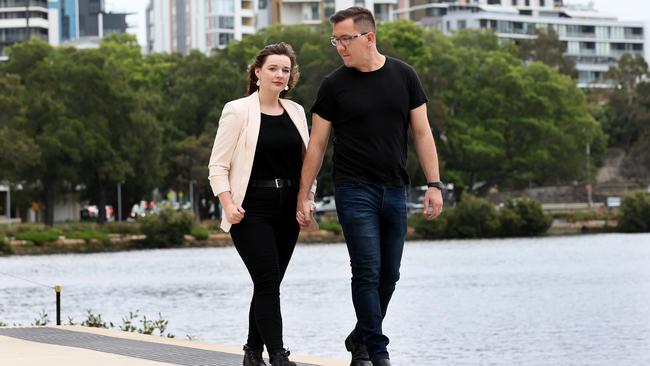Sydney couple lose $60K deposit as scammers target first homebuyers
Luke and Tiffany Hale spent five years saving $61K for their first home — but it only took seconds to lose their entire deposit to slick cyber criminals.

NSW
Don't miss out on the headlines from NSW. Followed categories will be added to My News.
Luke and Tiffany Hale spent five years saving up a deposit for a house — only to see it vanish in seconds thanks to scammers.
They are among a shocking number of Australians falling victim to business email compromise, which has jumped from 900 cases in 2019 to more than 1300 last year.
The Hales are fighting to get their money back but have come forward to tell their story in the hope of warning other homebuyers not to fall into the same trap.

The couple, both 27, had been searching for their first property for 12 months when their offer on a south Sydney apartment was accepted.
But when they paid the $61,000 deposit last Monday their money disappeared in seconds.
They had fallen victim to a business email compromise scam — an increasingly common scam targeting Australian homebuyers.
“My stomach instantly dropped when we realised and we didn’t sleep for a few nights after that,” Mr Hale said.
“There were probably two days of being inconsolable while coming up with an action plan of what to do next.”
Business email compromise scams target consumers paying large invoices.
Criminals hack the email accounts of businesses, replacing legitimate payment details with their own.
Consumers unwittingly transfer money to the scammers’ bank account, which is often emptied and closed before the alarm is raised.
“The real estate agent forwarded our broker an email and copied us into it, and that’s when we realised he had been speaking to a spoof email impersonating us,” Mr Hale said.
“He had received confirmation of the payment from us but it was really from this fake account and the receipt was an edited version of what we sent, with the bank details changed.
“As first homebuyers the whole process was new and unfamiliar to us so we didn’t see the red flags.”

Business email compromise scams, although not new, are fast becoming a favourite of thieves.
More than 1300 cases were reported to the Australian Competition and Consumer Commission’s Scamwatch last year, an increase of more than 30 per cent on 2019.
Last year victims suffered a combined loss of $128 million.
Cyber security expert Nigel Phair said it was important for victims to report scams to police.
“The thing about cyber criminals is they’re amazingly rational people and when they’re onto a winner, they stick with it,” Mr Phair said.
“In this day and age a home deposit is a large chunk of money, so homebuyers are a great target for them.”
Mr Phair said vigilance was the key to avoiding financial loss.
“For consumers, get confirmation in person or by phone of everything including the payment details,” he said.
“Businesses need to use two-factor authentication and maintain good cyber security.”
On Monday a 29-year-old Parramatta woman faced court, with police alleging she stole $1 million through an unrelated business email compromise scam.
But arrests are rare, with cyber criminals difficult to trace and often hiding behind stolen identities.

“Business email compromise scams aren’t easy to detect,” NSW Police Cybercrime Squad Commander Detective Superintendent Matthew Craft said.
“Get in the habit of checking the email address, URL and spelling used in all correspondence and heavily scrutinise all transactions you make online.”
The Hales hope to complete the purchase of their property but have had to take out a second loan to cover the missing deposit.
While they wait to see if their money can be recouped through the real estate agent’s insurance, they have a warning for others.
“Don’t be afraid to be the annoying customer who asks to be walked through everything and then to check and double check,” Mr Hale said.
Got a news tip? Email weekendtele@news.com.au
More Coverage
Originally published as Sydney couple lose $60K deposit as scammers target first homebuyers




